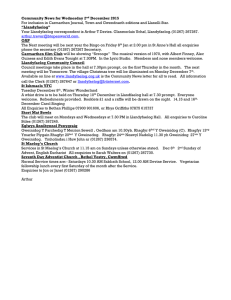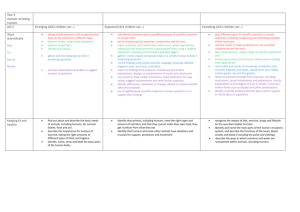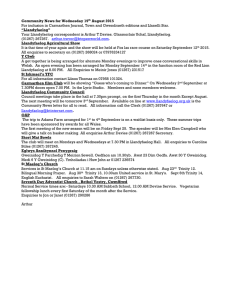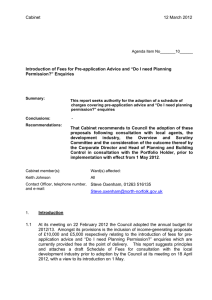OVERVIEW AND SCRUTINY COMMITTEE 16 JANUARY 2013 Agenda Item 13
advertisement
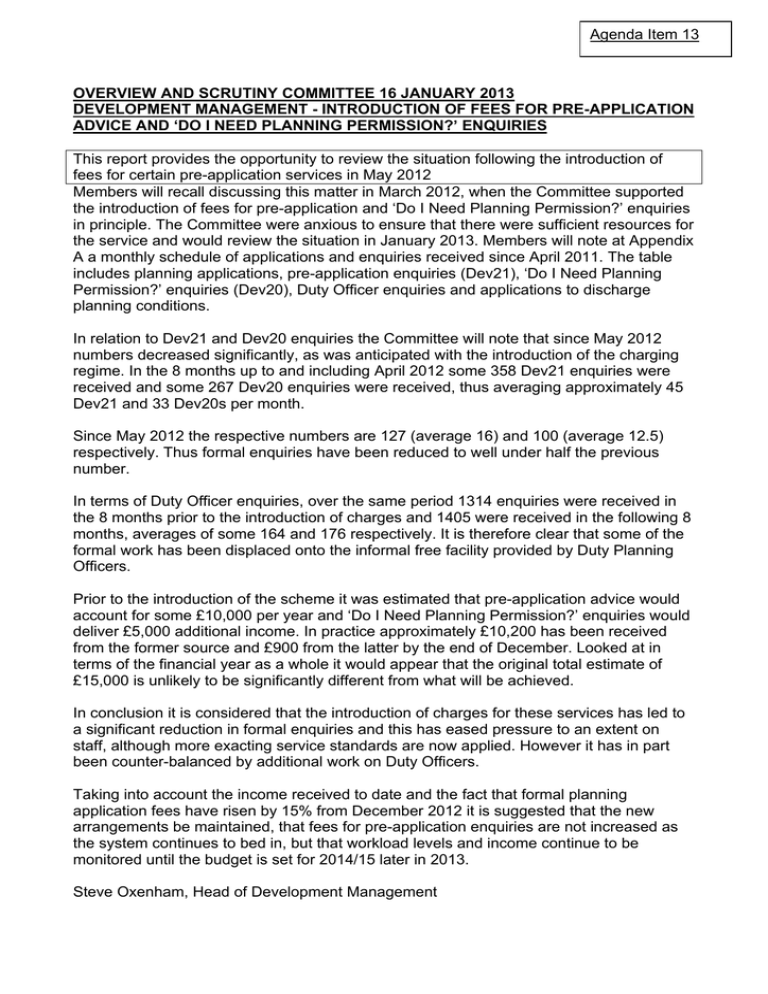
Agenda Item 13 OVERVIEW AND SCRUTINY COMMITTEE 16 JANUARY 2013 DEVELOPMENT MANAGEMENT - INTRODUCTION OF FEES FOR PRE-APPLICATION ADVICE AND ‘DO I NEED PLANNING PERMISSION?’ ENQUIRIES This report provides the opportunity to review the situation following the introduction of fees for certain pre-application services in May 2012 Members will recall discussing this matter in March 2012, when the Committee supported the introduction of fees for pre-application and ‘Do I Need Planning Permission?’ enquiries in principle. The Committee were anxious to ensure that there were sufficient resources for the service and would review the situation in January 2013. Members will note at Appendix A a monthly schedule of applications and enquiries received since April 2011. The table includes planning applications, pre-application enquiries (Dev21), ‘Do I Need Planning Permission?’ enquiries (Dev20), Duty Officer enquiries and applications to discharge planning conditions. In relation to Dev21 and Dev20 enquiries the Committee will note that since May 2012 numbers decreased significantly, as was anticipated with the introduction of the charging regime. In the 8 months up to and including April 2012 some 358 Dev21 enquiries were received and some 267 Dev20 enquiries were received, thus averaging approximately 45 Dev21 and 33 Dev20s per month. Since May 2012 the respective numbers are 127 (average 16) and 100 (average 12.5) respectively. Thus formal enquiries have been reduced to well under half the previous number. In terms of Duty Officer enquiries, over the same period 1314 enquiries were received in the 8 months prior to the introduction of charges and 1405 were received in the following 8 months, averages of some 164 and 176 respectively. It is therefore clear that some of the formal work has been displaced onto the informal free facility provided by Duty Planning Officers. Prior to the introduction of the scheme it was estimated that pre-application advice would account for some £10,000 per year and ‘Do I Need Planning Permission?’ enquiries would deliver £5,000 additional income. In practice approximately £10,200 has been received from the former source and £900 from the latter by the end of December. Looked at in terms of the financial year as a whole it would appear that the original total estimate of £15,000 is unlikely to be significantly different from what will be achieved. In conclusion it is considered that the introduction of charges for these services has led to a significant reduction in formal enquiries and this has eased pressure to an extent on staff, although more exacting service standards are now applied. However it has in part been counter-balanced by additional work on Duty Officers. Taking into account the income received to date and the fact that formal planning application fees have risen by 15% from December 2012 it is suggested that the new arrangements be maintained, that fees for pre-application enquiries are not increased as the system continues to bed in, but that workload levels and income continue to be monitored until the budget is set for 2014/15 later in 2013. Steve Oxenham, Head of Development Management


